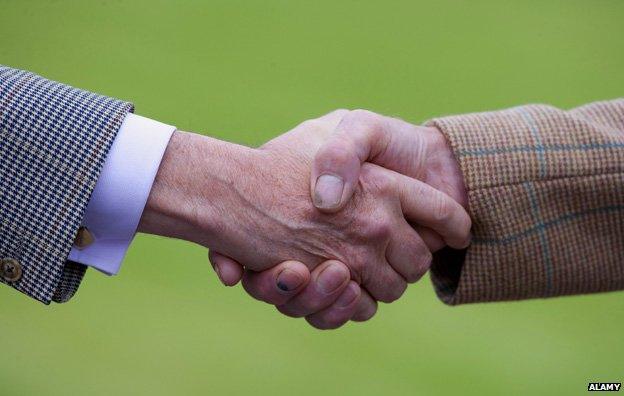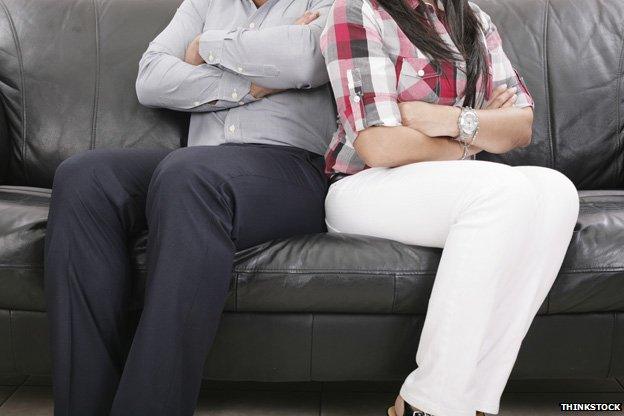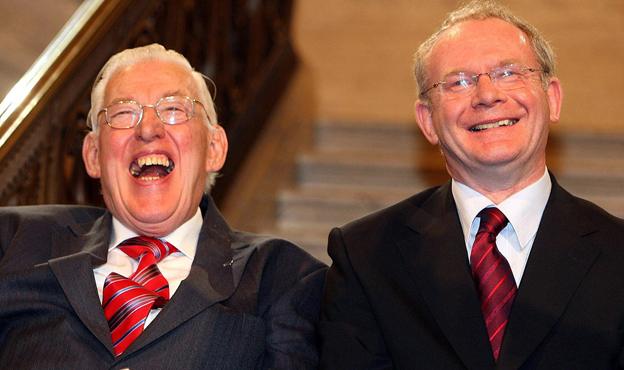Viewpoint: A marriage counsellor on healing the referendum hurt
- Published

Most people behaved themselves during the referendum campaign but there were outbreaks of rancour. How would a family counsellor heal the rifts, asks Phillip Hodson.
At a general election family members often belong to opposing parties and yet still eat together. In this referendum, people have occasionally separated along bitter, internecine lines. Internet trolls on both sides have used inflammatory language. The parents of one Glaswegian married to a Londoner are refusing to speak to them because they planned to vote "for the other side". Young people have "unfriended" each other on Facebook or tattooed their necks with their indelible allegiances.
Where did it all go wrong? For a marriage therapist that's not an uncommon question. Part of the answer says that when relationships fail and we need to part, we exaggerate our differences in order to destroy the remaining ties of affection. Then we "present our demands" to gain power over the situation and secure the outcome.
Some of the outbreaks of nastiness in this campaign flowed from the fact that, down the centuries Scotland and England had created bonds of togetherness. Therefore separatists felt compelled to insist there were no past benefits to the union. And "No" voters began to demonise the SNP. It could be any old married couple when faced with family breakdown.
.jpg)
And there's the rub. In a contested divorce, one side gets what it wants but both parties end up hurting. And so we reach the nub of the question - the morning after.
We know that in the aftermath of the Quebec independence vote (which was lost by one half of one percentage point) the defeated leader, Jacques Parizeau, said: "The temptation to take revenge is going to be something!"
So how can a warring couple heal their differences in a situation where geography and family entanglements ensure continuous contact?

The first rule is to understand a diagram my old therapy mentor used to call "the couple in the triangle". It states that there are always three elements present in any complex marital union - the two individuals plus their relationship. The last element continues regardless of any divorce.
Often when couples in counselling are hurling abuse at each other I have to point at the floor in front of them. This is where I've asked them to imagine their poor relationship. "It seems unwise to kill it completely," I tell them. "You have children. You need to negotiate. You cannot entirely obliterate the other side. Don't we have a duty to find some sort of modus vivendi?"
Admittedly this would have been a sight to behold in the event that two polarised nations have to divide their matrimonial property, pensions and purses. That would entail the mother and father of all battles but the principle stands. In any domestic conflict, if one side entirely "wins", the relationship will get slaughtered.
.jpg)
The second rule is based on a cod American proverb: "Walk a mile in my moccasins before you judge me." For many people throughout Scotland, this weekend will be filled with grief. Dreams must die - or at least be radically postponed. Bereavement is a necessary process for all humans who experience a loss. We cannot go "round" it. Only through it. It will involve a range of emotional stresses from fury to despair, denial to depression. Both sides should therefore prepare for a fresh emotional ordeal. This will involve possible further unpleasantness. But only if we show ultimate respect for the suffering loser will the situation heal. It's not an impossible goal - think of Martin McGuinness giving an emotional tribute to Ian Paisley.

Reconciled - the enemies who became friends

Ian Paisley and Martin McGuinness
Ian Paisley and Martin McGuinness were former enemies from the Northern Ireland troubles, who ended up heading the power-sharing executive at Stormont
The Democratic Unionist Party leader and the Sinn Fein politician became unlikely friends while serving as first minister and deputy first minister of Northern Ireland - and gained the nickname of "the Chuckle brothers"
When Paisley died this month, McGuinness paid tribute, saying, "I developed a close working relationship... which developed into a friendship, which despite our many differences lasted beyond his term in office."

The final rule is that people mean what they do, not what they say. Forget all the hot air and blather from extreme politicians or the lunatic fringe. We will now be required to act collectively for the next passage of history. Every single one of us could think about becoming better behaved for the common good.
As counsellors try to explain to reconciling couples, you can't just sweep your differences under the carpet and restart. You cannot magically regain the trust. You have to begin at rock bottom taking it in small stages to discover reliable common ground and speak with tact about the legacy in dispute. Then demonstrate by your daily actions whether you care to bury the hatchet or you don't.
Phillip Hodson, external is a psychotherapist and Fellow of the British Association for Counselling and Psychotherapy
Subscribe to the BBC News Magazine's email newsletter to get articles sent to your inbox.